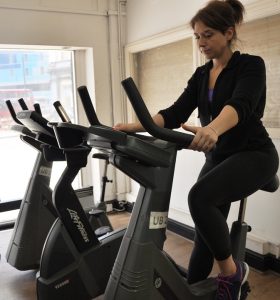During physical activity or exposure to hot environments, individuals with multiple sclerosis (MS) can experience heat intolerance, which leads to the rapid onset of fatigue. The underlying cause of this deterioration, known as Uhthoff’s phenomenon among MS researchers, remains unknown (Opara et al. 2016).
Due to Uhthoff’s phenomenon, individuals with MS are sometimes advised to limit physical activity and remain indoors during hot weather, which can then affect their employment prospects and/or quality of life. Strategies to cool the body have been reported to help control Uhthoff’s phenomenon. However, some of these strategies, like submerging the body in cold water or standing in a large refrigerator, are not practical in everyday life. A more realistic strategy is the ingestion of cold fluids during physical activity. This strategy is recommended by organisations like the National MS Society (USA), the MS Society (UK), and MS Queensland (Australia). However, the effect of cold water ingestion on core temperature and exercise tolerance in individuals with MS has not been formally tested.

Our recent study (Chaseling et al. 2018) examined the effects of drinking cold water (1.5°C) and thermoneutral water (37°C) on core body temperature and exercise tolerance in 10 heat-sensitive MS patients (relapsing–remitting MS) and 10 individuals without MS (control group). All participants completed two experimental sessions which were separated by at least 48 hours. In both, they performed lower-body cycling exercise at a fixed intensity (~40% VO2max) for 60 minutes (if possible) in a warm environment (30°C). The only difference between the sessions was that in one, the thermoneutral water was consumed during exercise, whereas in the other, the cold water was consumed. Participants drank the water at the 15th, 30th, and 45th minutes of exercise, and the amount of water was scaled to each participant’s body mass (3.2 mL/kg).
WHAT DID WE FIND?
With ingestion of the thermoneutral water, exercise time was nearly 50% shorter in the MS group than in the control group. However, when individuals with the MS drank the cold water during exercise, they improved their time to exhaustion by ~30%. Another interesting finding was that although drinking cold water improved exercise tolerance in the MS group, it did not blunt their rise in rectal or skin temperatures during the exercise.
SIGNIFICANCE AND IMPLICATIONS
Our results indicate that cold water ingestion can be used to improve exercise tolerance in individuals with MS. Also, the findings suggest that cold-afferent thermoreceptors in the abdominal and oral cavities play a role in modulating exercise tolerance. However, for patients who are susceptible to urinary incontinence, additional fluid ingestion might not be an optimal solution. Therefore, future research will need to establish whether stimulation of cold-afferent thermoreceptors in the mouth, e.g. via a cold mouth rinse, is sufficient to improve exercise tolerance in individuals with MS.
PUBLICATION REFERENCE
Chaseling GK, Filingeri D, Barnett M, Hoang P, Davis SL, Jay O. Cold water ingestion improves exercise tolerance of heat sensitive people with MS. Med Sci Sports Exerc 50:643-648, 2017.
If you cannot access the paper, please click here to request a copy.
KEY REFERENCES
Opara JA, Brola W, Wylegala AA, Wylegala E. Uhthoff’s phenomenon 125 years later – what do we know today? J Med Life 9:101-105, 2016.
AUTHOR BIO
 Dr. Phu Hoang has been working as a clinical physiotherapist and researcher for 20 years. His research on rehabilitation in MS patients attempts to address three questions: (1) what are the characteristics of MS patients who are prone to falling? (2) are these characteristics amendable via physiotherapy interventions? (3) can exercise slow down the progression of MS? Dr. Hoang’s other blogs on MS can be found here.
Dr. Phu Hoang has been working as a clinical physiotherapist and researcher for 20 years. His research on rehabilitation in MS patients attempts to address three questions: (1) what are the characteristics of MS patients who are prone to falling? (2) are these characteristics amendable via physiotherapy interventions? (3) can exercise slow down the progression of MS? Dr. Hoang’s other blogs on MS can be found here.
